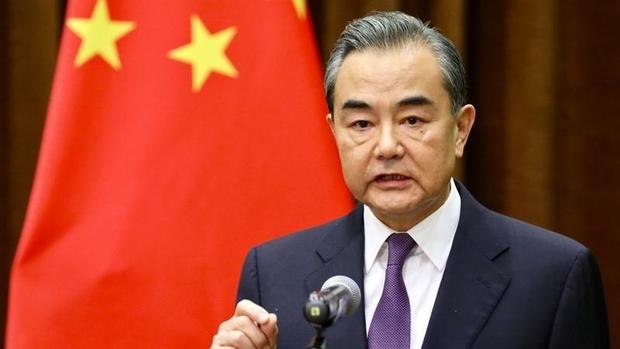FM: Decoupling attempts will harm those that propose it
 Wang Yi, State Councilor and Foreign Minister. (ZHU XINGXIN / CHINA DAILY)
Wang Yi, State Councilor and Foreign Minister. (ZHU XINGXIN / CHINA DAILY)
Starting a “new Cold War” is to reverse the course of history and kidnap the whole world, visiting Chinese State Councilor and Foreign Minister Wang Yi said in Rome on Aug 25.
Wang made the remarks at a press briefing in the capital of Italy with Italian Foreign Minister Luigi Di Maio after their talks.
Responding to a question regarding China’s comments on the so-called “new Cold War” that China and the US are possibly heading into, Wang said China does not intend to engage in such a Cold War and is firmly against any hype about a so-called “new Cold War”.
Claiming to launch a “new Cold War” is to reverse the course of history, to serve one’s own interests and to kidnap people from all over the world, he said.
In Wang’s view, such an attempt “is against the world development trend. And I think countries in the world are not going to be behind this mentality. Instead we are going to join hands to oppose anyone who is trying to drag us back into that ‘law of the jungle’.”
A 20,000-word article filed by Xinhua News Agency on Aug 24 rebuked US Secretary of State Mike Pompeo’s speech delivered at the Richard Nixon Presidential Library in California in July, saying it negated every aspect of China-US relations and misrepresented history and reality.
The root cause of the trust deficit between China and the US is the Cold War mentality, ideological bias, and zero-sum-game mindset of certain US politicians, who have misread, misjudged or deliberately distorted China’s strategic intention and its internal and external policies, said Xinhua. (Part 1 of the article is on pages 22-26 of this issue of China Daily Global Weekly.)
Italy is the first leg in Wang’s first foreign tour as the COVID-19 epidemic eases. The official visit in Europe from Aug 25 to Sept 1 also includes the Netherlands, Norway, France and Germany.
Di Maio said that Italy hopes to further strengthen the existing cooperation mechanism between the two countries and will push for new progress in important cooperation projects within the Belt and Road framework.
Italy stands ready to serve as a bridge for East-West communication and a link for China-EU exchanges, he said.
Wang said China is willing to share the opportunities of China’s development with the rest of the world. The more China develops, the wider its door to the outside world will open.
When meeting with Canadian Foreign Minister Francois-Philippe Champagne in Rome, Wang called on Canada to make independent decisions to eliminate major barriers in bilateral relations amid Ottawa’s prolonged detention of Meng Wanzhou, the financial chief of Chinese telecommunications company Huawei.
“He who started the trouble should end it,” Wang said, urging Canada to properly understand the issue, expressing his hope that Canada should act as an independent country and resolve the matter as soon as possible.
Champagne, for his part, said that the past 50 years have witnessed significant development of China-Canada relations, adding that the Canadian side is willing to work with China, in the spirit of mutual respect, to seek a way to solve problems in order to boost bilateral relations.
Wang on Aug 24 spoke out against decoupling between China and the United States, saying that it goes against market economy principles and would ultimately harm those that propose it.
Wang made the remark when meeting the media with Hungarian Minister of Foreign Affairs and Trade Peter Szijjarto after their meeting at Beihai, in the Guangxi Zhuang autonomous region.
Decoupling is neither workable nor reasonable, Wang said, adding that it is doomed to fail as it disregards one’s own development needs and also harms the public interest.
Wang noted that China is the world’s largest potential market and will provide greater development space as well as market opportunities for other countries as it further stimulates and rejuvenates domestic demand.
Any attempt to decouple with China means decoupling with the world’s largest market in the future, he said.
Wang also said that as supporters of globalization and a multilateral trade system, China and Europe should not allow calls for decoupling to disrupt the normal operation of global industrial and supply chains.
The two sides also should not allow normal international economic exchanges to be sabotaged by unilateral hegemonic acts, he added.
Separately, Hong Kong’s top commerce official condemned on Aug 24 a US move to force the city to relabel all of its exports to the US as being from China as “unfair and uncivilized”.
The new rule demanding that Hong Kong relabel its exports to the US will take effect on Nov 9, following the US presidential election on Nov 3.
Hong Kong Secretary for Commerce and Economic Development Edward Yau Tang-wah said that the measure is unnecessary, unreasonable and malicious.
On Aug 21, US Customs and Border Protection announced that enforcement of the new rule would be postponed for 45 days.
The rule was originally scheduled to take effect on Sept 25.
Hong Kong is a separate member of the WTO and enjoys a special status as a separate customs territory under “one country, two systems”. Products exported from Hong Kong are marked as “Made in Hong Kong”.
Yau said the US wanted “Made in Hong Kong” to disappear, which was “unfair and uncivilized”.
The Hong Kong Special Administrative Region will definitely take action to protect its rights and interests, he said, and would take the matter to the WTO.
Willy Lin Sun-mo, chairman of the Hong Kong Productivity Council, said the new rule has caused considerable confusion as it involves international labeling requirements and companies are perplexed about the risk of breaching trade description rules.
Pamela Lin in Hong Kong and Xinhua contributed to the report.


